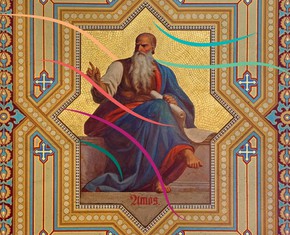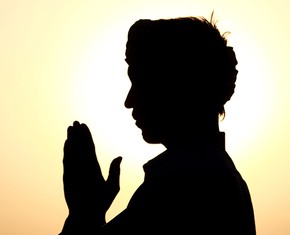The views expressed in our content reflect individual perspectives and do not represent the authoritative views of the Baha'i Faith.
When a family member or loved one comes down with a serious illness or experiences severe difficulties, we sometimes say: “I’ll be praying for you.”
When we hear of friends or acquaintances in need, our empathy finds a channel in prayer.
When we learn that someone we know has died, we might pause and offer up a silent prayer on his or her behalf. When we feel sick, anxious, or fearful, we pray for ourselves that we might heal or find celestial comfort.
RELATED: Three Reasons to Greet Each Morning with Dawn Prayers
What prompts this action unless we believe, somewhere deep inside, that our prayers matter, have power, and are heard?
I believe that our prayers are more powerful than we could ever imagine; that each prayer is respectively heard and attended to by the Creator. Support may come from the spiritual world beyond this one. Perhaps a relative who has passed will intervene on our behalf. But in all cases, the assistance originates from God.
Several nights ago, I awakened to the sound of piercing shrieking and sobbing. I knew at once that it was the toddler across the street. This baby has mild cognitive issues, and I often hear him fussing or weeping, but on this night it was much worse than usual. His pitiful screams echoed through our neighborhood for several painful hours. The child’s very young mother is single and unfortunately, ill-equipped to manage his issues on her own with no support from the father. As the poor toddler wailed, gasping to catch his breath, she let out a long scream at the top of her lungs:
“Shut up!” And then a few seconds later: “Lay down!”
This only frightened and further traumatized the child, intensifying his wailing until he was completely distraught. As I listened to his neglected cries I could hear he was getting the opposite of the comfort that he needed. Feeling heartbroken and helpless, it finally occurred to me that I could try praying for him. I desperately wanted to soothe him somehow. Then I remembered a short quote from Abdu’l-Baha:
Spirit has influence; prayer has spiritual effect. Therefore, we pray, “O God! Heal this sick one!” Perchance God will answer. God will answer the prayer of every servant if that prayer is urgent.
So I closed my eyes and as intensely as I could, imagined myself beside him. In my mind I took the child in my arms and rocked him on my lap. I stroked his little face and sang a lullaby just like I once did when my children were young. I whispered prayers in his ears, reassuring him that he was loved. A few brief moments passed, and suddenly, the crying abruptly stopped. A total hush came over the neighborhood. I waited for the cries to resume, but there was only complete and peaceful silence the rest of the night.
Taking a deep breath and uttering a huge sigh of relief, I felt perfectly aware that I was not responsible for this minor miracle, but simply grateful and in awe. Maybe it was just a coincidence — although for the child to stop crying so abruptly after hours of constant wailing seemed highly unlikely. Perhaps an angel sent by God heard my prayers and carried them on their compassionate wings to solace the child.
RELATED: How Prayer Creates Positive States of Mind
The writings of the Baha’i Faith confirm such mystical experiences. Our prayers have unseen power, whether they journey across the street or across the planet. Sometimes we feel the power of our prayers immediately, and other times we need to have faith that their effects will sooner or later be felt or realized. Baha’u’llah promised that:
Whoso reciteth, in the privacy of his chamber, the verses revealed by God, the scattering angels of the Almighty shall scatter abroad the fragrance of the words uttered by his mouth, and shall cause the heart of every righteous man to throb. Though he may, at first, remain unaware of its effect, yet the virtue of the grace vouchsafed unto him must needs sooner or later exercise its influence upon his soul.
The Baha’i teachings say that the degree of sincerity, detachment, and purity of our prayers gives them greater capacity:
The most acceptable prayer is the one offered with the utmost spirituality and radiance; its prolongation hath not been and is not beloved by God. The more detached and the purer the prayer, the more acceptable is it in the presence of God.
The scriptures of every major religious Faith refer to the “Names of God.” The Baha’i writings say they include the: “The All-Knowing Physician,” “the All-Merciful, the Beloved, the Ever-Forgiving, the Help in Peril, the Loving, and the Mystic Source.” These titles demonstrate that the Creator has the power to transmute and transform any situation. When we call on God, Baha’u’llah wrote, our prayers can be answered:
Thou art He, O my God, through Whose names the sick are healed and the ailing are restored, and the thirsty are given drink, and the sore-vexed are tranquilized, and the wayward are guided, and the abased are exalted, and the poor are enriched, and the ignorant are enlightened, and the gloomy are illumined, and the sorrowful are cheered, and the chilled are warmed, and the downtrodden are raised up.
So, the next time you wonder about the effect of your prayers, be they for others, for yourself, or even our planet — rest assured that each one has power, is heard, and has the potential to change what ails us.
















Comments
Sign in or create an account
Continue with Googleor